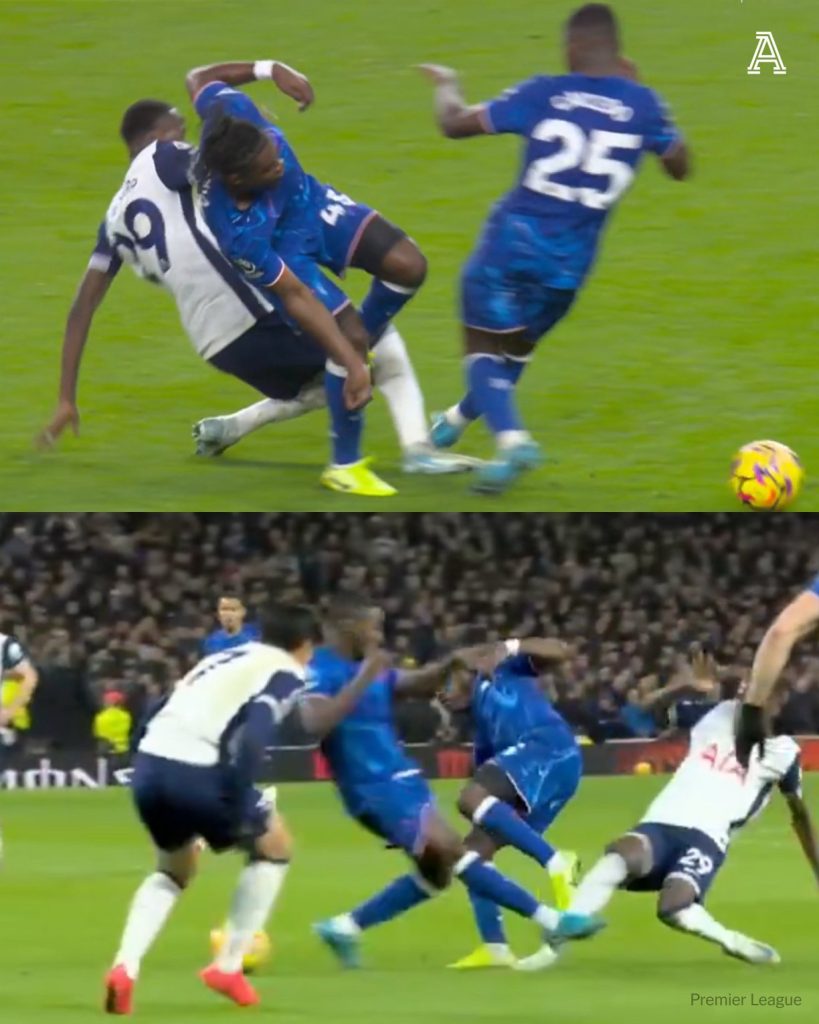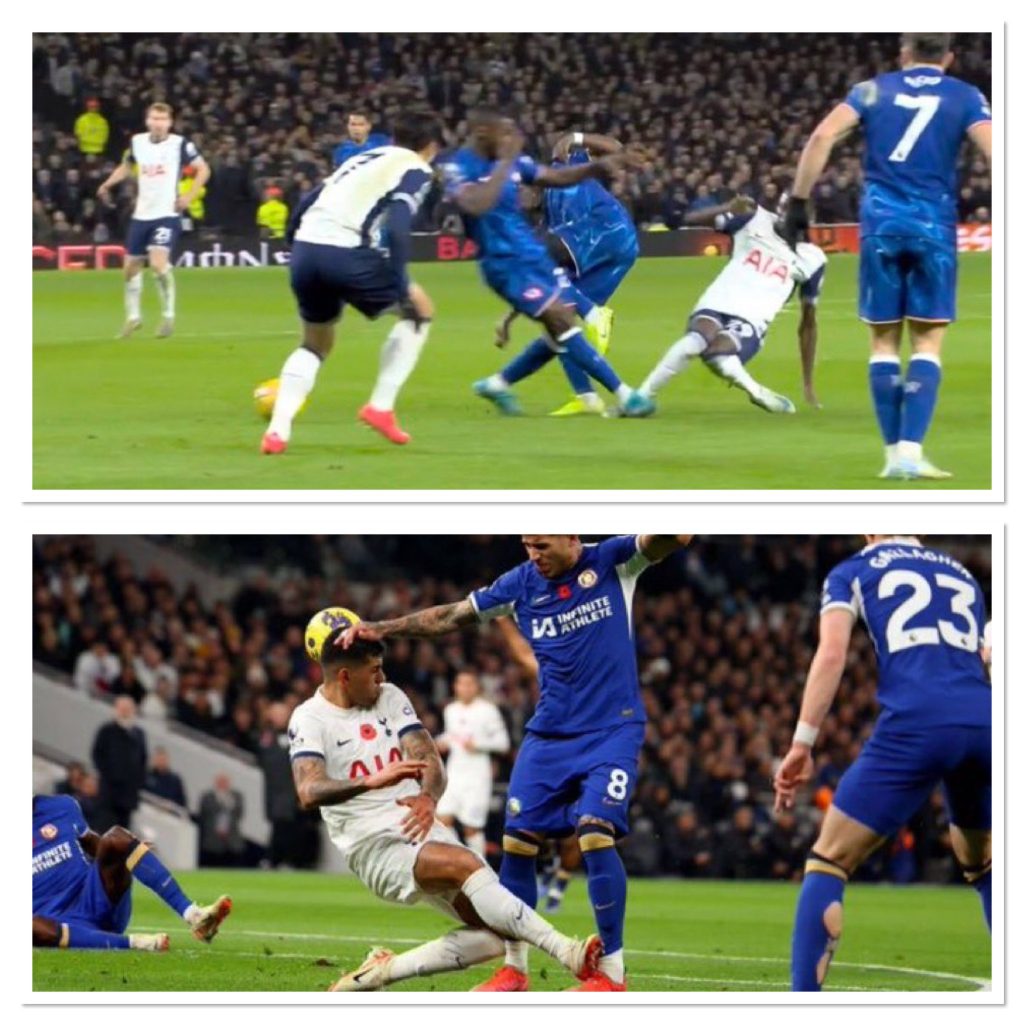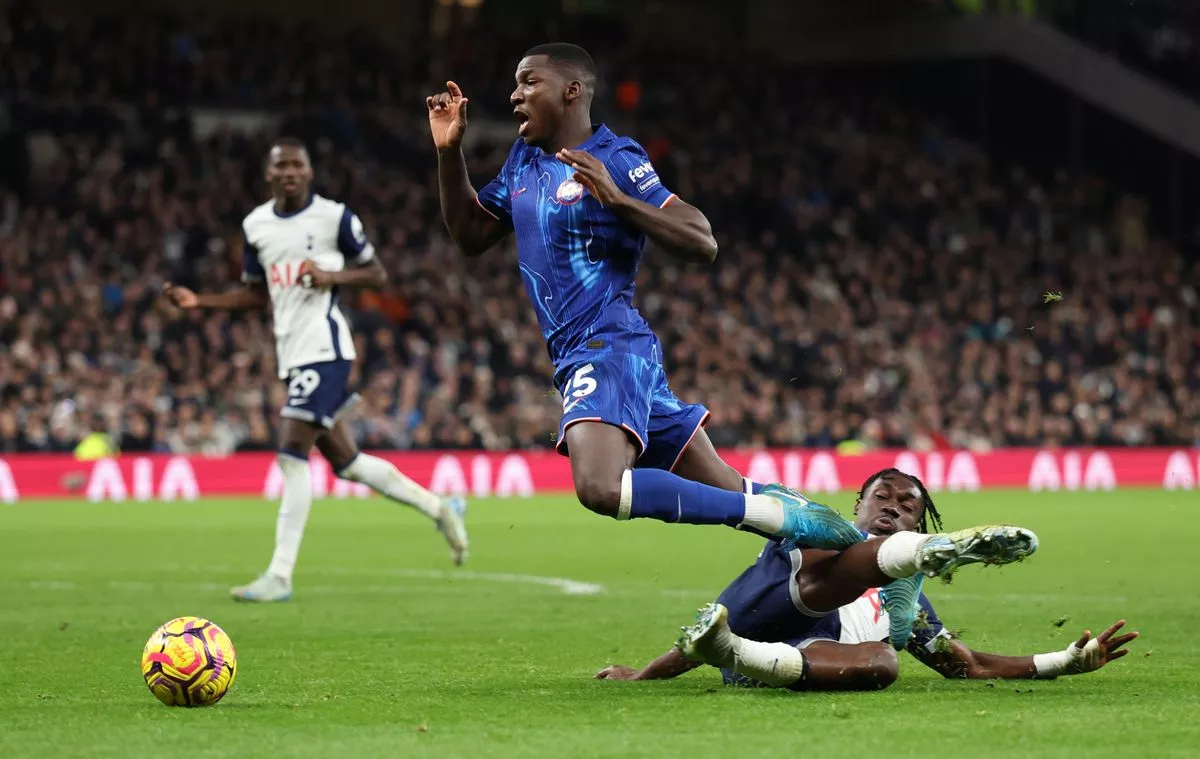Chelsea orchestrated a stunning comeback to defeat Tottenham Hotspur 4-3 in North London, but the match did not pass without controversy. One of the pivotal moments came when referee Anthony Taylor chose not to send off Chelsea’s Moises Caicedo for a contentious first-half challenge.
The incident left Tottenham frustrated, with many questioning the decision and its implications for the outcome of the game.
The controversy arose when Caicedo went in high on Pape Matar Sarr during the first half. Despite the challenge appearing reckless to many onlookers, the Video Assistant Referee (VAR) deemed it unworthy of a red card.
In a statement shared on social media, the Premier League Match Centre explained that VAR had reviewed the incident and confirmed Taylor’s decision, stating there was “no serious foul play.” This decision would later prove crucial, as Caicedo played a significant role in Chelsea’s resurgence, earning the penalty that helped his team level the match.
Tottenham had every reason to feel aggrieved. Just before the hour mark, Caicedo was brought down in the box by Yves Bissouma, earning Chelsea a penalty that Cole Palmer converted to make it 2-2.

The Ecuadorian midfielder’s presence on the pitch following the earlier challenge on Sarr became a focal point for criticism, with fans and pundits questioning the lack of consistency in officiating.
This was not the only contentious moment in the match. Earlier in the first half, Spurs winger Dejan Kulusevski appeared to catch Chelsea’s Romeo Lavia with a high arm.
However, VAR once again refrained from escalating the incident, deeming the contact accidental and allowing Kulusevski to remain on the pitch. These decisions highlighted the subjective nature of VAR interpretations and further fueled debates about its reliability.
Tottenham initially seemed to be cruising to victory, racing to a two-goal lead within the first 20 minutes. Dominic Solanke opened the scoring, and Kulusevski doubled the advantage shortly after.
However, their fortunes shifted dramatically when Cristian Romero, returning from injury, was forced off after just 15 minutes of play. Romero’s absence destabilized Tottenham’s defense, leaving gaps that Chelsea eagerly exploited.
Chelsea’s comeback began with Jadon Sancho, who scored for the second consecutive match to bring the visitors back into contention. Cole Palmer then stepped up to convert the equalizing penalty, setting the stage for a dramatic second half.

Enzo Fernandez added a third for Chelsea with 17 minutes left, putting them ahead for the first time in the game. Moments later, Palmer won another penalty after being brought down by Sarr, and he calmly converted it to notch Chelsea’s fourth goal.
Despite a late strike from Son Heung-min, Spurs could not recover, leaving their fans to dwell on the game’s controversial turning points.
The fallout from the match extended beyond the pitch. Fans and analysts alike were left baffled by the VAR decision that allowed Caicedo to remain on the field. Many argued that his high, late challenge on Sarr met the criteria for serious foul play and warranted a red card.
Critics pointed to the inconsistency in officiating, with some recalling an incident involving Tottenham’s Cristian Romero in the same fixture last season.
On that occasion, Romero received a red card for a high challenge on Enzo Fernandez, with Chelsea awarded a penalty as a result. The parallels between the two incidents only deepened the frustration among Tottenham supporters.
Social media buzzed with reactions to the Caicedo incident. One fan questioned the definition of serious foul play, noting, “How is studding someone’s shin not a red card?” Another described it as “the most obvious red card of the season,” highlighting the high, late, and excessive nature of the challenge.
Former Premier League referee Mark Clattenburg also weighed in, contrasting the decision with his past experiences. Writing about Romero’s red card from last season, Clattenburg remarked, “Football has changed so much.
Playing the ball is no longer enough to avoid a red.” His comments underscored the evolving standards in football officiating and the growing emphasis on player safety.
For Chelsea, the victory marked an important step in their resurgence, as they demonstrated resilience and capitalized on their opportunities. For Tottenham, however, the result was a bitter pill to swallow.
Beyond the immediate disappointment of losing a match they had led so convincingly, the lingering controversies added to the frustration of fans and players alike.
Manager Ange Postecoglou, already under scrutiny, now faces the challenge of regrouping his squad and addressing the lapses that allowed Chelsea to turn the game on its head.
The match at the Tottenham Hotspur Stadium was a thrilling showcase of Premier League drama, with twists, turns, and controversies aplenty.
While Chelsea emerged victorious, the debate surrounding the officiating decisions ensured that the game would remain a talking point long after the final whistle.
For Tottenham, the focus now shifts to finding consistency and resolving the issues that have plagued their campaign, while Chelsea will look to build on this momentum as they aim to climb the league table.

